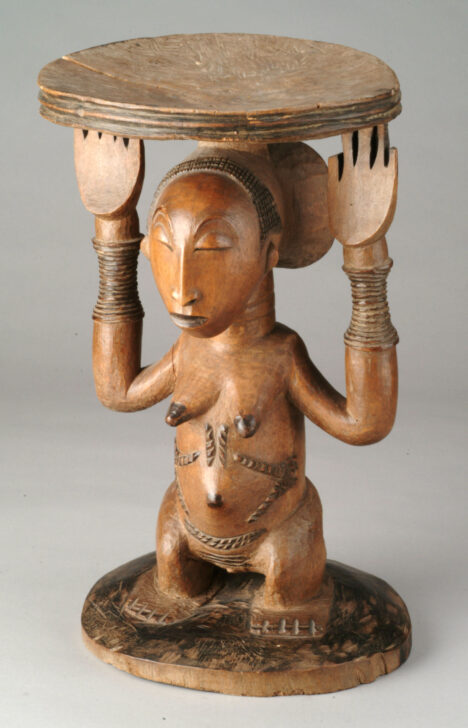Chief’s Stool
Hemba

Description
Subject Matter:
This Hemba kihona, or ceremonial stool, is attributed to the Southern Hemba from the Democratic Republic of the Congo. Stools such as this one constituted an instrumental element of the chief’s regalia and would have been present in royal ceremonies including investiture. During these occasions, the stool would be placed on a leopard skin, forming a dignified throne for the chief. The richly sculpted figure represents a deceased female ancestor whose spirit resides within. With her feet firmly planted on the ground and her fingertips carrying the chief’s seat, she symbolically links the world of the dead with the world of the living. Her spirit not only guarantees the power of the chief but also confers protection to members of his community. Thus, as an insignia, the stool legitimates the chief’s authoritative position and revered status as well as serves as a visual reminder--both to himself and his people--of his tremendous social responsibility.
Reference:
Maurer, Evan M. and Niangi Batulukisi. Spirits Embodied: Art of the Congo, Selections from the Helmut F. Stern Collection. Minneapolis: The Minneapolis Institute of Arts, 1999.
Physical Description:
This stool features an elegantly carved standing female caryatid supporting the seat. It exhibits the characteristic hallmarks of a Southern Hemba style, which in turn was strongly influenced by the neighboring Luba. These traits include the broad, rounded forms of the sculpture, the disproportionately large head, the ovoid face with a subdued expression, a wide convex forehead, the brow ridge defined in relief, half-closed eyes, the elongated nose, the narrow mouth with clenched lips, the protruding abdomen with a pointed umbilicus, scarification patterns on the torso, and a multitude of sculpted bracelets upon both wrists. Also emblematic of Southern Hemba sculptural forms is the elaborate pulled-back chignon hairstyle (kibanda), which forms a cruciform motif in the rear. The figure also possesses conical breasts, short squat legs, and flat feet. The tips of the figure’s fingers symbolically carry the circular seat.
Usage Rights:
If you are interested in using an image for a publication, please visit https://umma.umich.edu/request-image/ for more information and to fill out the online Image Rights and Reproductions Request Form.